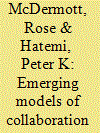|
|
|
Sort Order |
|
|
|
Items / Page
|
|
|
|
|
|
|
| Srl | Item |
| 1 |
ID:
096201


|
|
|
|
|
| Publication |
2010.
|
| Summary/Abstract |
In increasing numbers, political scientists are engaging in collaborative research. It is useful to consider the advantages of such efforts and to suggest strategies for finding optimal collaborators. In addition, there are issues and challenges that arise in the face of increased collaboration, particularly interdisciplinary collaboration across the life and social sciences. Inevitably, as the discipline has moved from a dominant solo-author model to a wider array of authorship possibilities, whether those teams encompass two-person partnerships, large research teams, or something in between, new administrative and cultural questions have already begun to surface as the discipline works to assimilate these changes. Consonant with previous efforts by the American Political Science Association (Biggs 2008; Chandra et al. 2006), we seek here to continue a broader disciplinary conversation surrounding the opportunities and challenges posed by more diverse patterns of teamwork. In so doing, we hope to help continue to encourage transparent, predictable, and openly collaborative intellectual partnerships wherein individuals receive the institutional credit and merit they deserve.
|
|
|
|
|
|
|
|
|
|
|
|
|
|
|
|
| 2 |
ID:
152820


|
|
|
|
|
| Summary/Abstract |
We combine evolutionary and neurobiological models to provide a theoretically rigorous framework for understanding the origin of political leadership in democratic structures and how such qualities interact with institutional incentives and constraints. Evolutionary, behavioral-genetic, neuropsychological, and physiological studies have identified biological systems related to particular types of leadership behaviors as well as the emergence of leadership itself. These biological systems emerge during specific life stages and interact with a person's life history, influencing the environments one selects into and the perception of those experiences and subsequent reactions to them; these circumstances reinforce, suppress, and inspire various leadership characteristics. Our framework provides insight into the foundational basis of leadership qualities and explains why and how we observe variation in such traits. The evolutionary functions of leadership, including approaches to collective action problems, leader–follower dynamics, institutional and organizational environments, and leader attributes are discussed, and in so doing, we propose several novel questions that can be addressed from this perspective, which suggest new and fruitful lines of research in leadership studies.
|
|
|
|
|
|
|
|
|
|
|
|
|
|
|
|
|
|
|
|
|